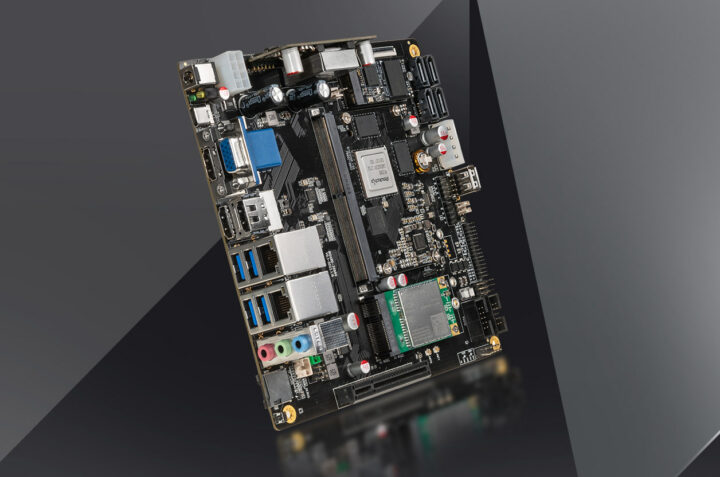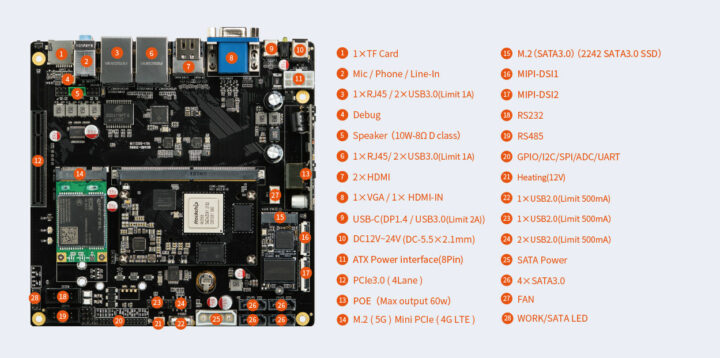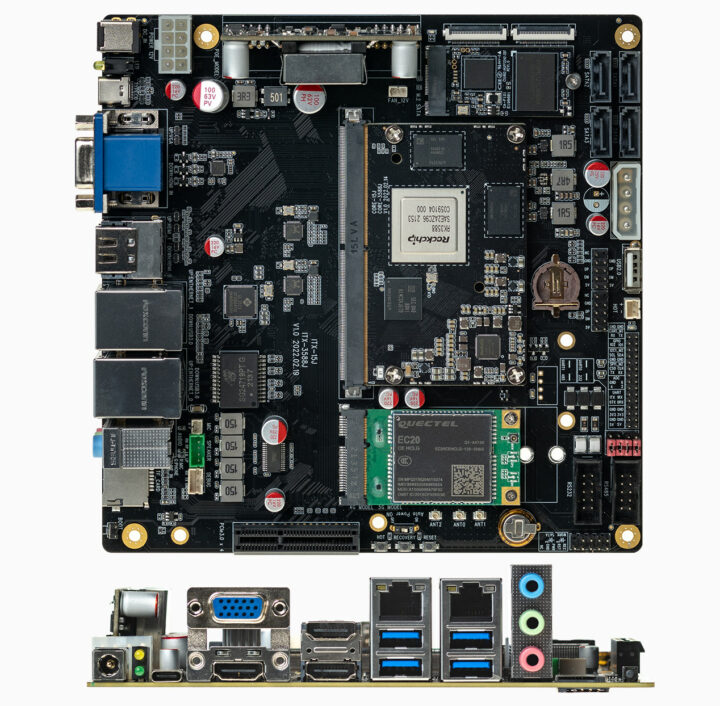After Radxa ROCK5 Pico-ITX SBC and Banana Pi RK3588 SoM and devkit, Firefly ITX3588J mini-ITX motherboard is the third hardware platform we’ve seen with Rockchip RK3588 octa-core Cortex-A76/A55 processor.
The board will be interesting to people wanting an Arm PC or workstation as the mini-ITX form factor will allow the board to be fitted to a standard enclosure, and there’s plenty of resources and I/Os with up to 32GB RAM, four SATA ports, multiple 8K/4K video outputs and inputs, dual Gigabit Ethernet, WiFI 6 and Bluetooth 5.0, a PCIe 3.0 x4 slot, and more.
Firefly ITX3588J mini-ITX motherboard specifications:
- SoC – Rockchip RK3588 octa-core processor with four Arm Cortex-A76 cores @ up to 2.4 GHz, four Arm Cortex-A55 cores, ArmMali-G610 MP4 quad-core GPU with support for OpenGL ES3.2, OpenCL 2.2, Vulkan1.1, 6 TOPS NPU, 48MP ISP, 8Kp60 video decoding, 8Kp30 video encoding
- System Memory – 4GB, 8GB, 16GB, or 32GB LPDDR4/LPDDR4x/LPDDR5 memory
- Storage
- 16GB, 32GB, 64GB, or 128GB eMMC flash
- 1x M.2 SATA 3.0 for 2242 SSD
- 4x SATA3.0 ports
- Video I/F
- Output
- HDMI 2.1 up to 8Kp60 or 4Kp120
- HDMI 2.0 up to 4Kp60
- 2x MIPI-DSI up to 4Kp60fps
- DP 1.4 up to 8Kp30 (multiplexed with USB3.0)
- VGA port
- Input
- 1x HDMI-IN up to 4Kp60 with support for HDCP 2.3
- 2x 2-lane MIPI-CSI input or 1x 4-lane MIPI-CSI input for camera
- Multi-channel 8K video output and 4K video input, up to four-screen output
- Output
- Audio
- 1x Speaker output (10W-8Ω D class)
- 1x Line-Out
- Digital audio output via HDMI and DP ports
- 1x Line-In, 1x MIC-in input, 1x HDMI input
- Networking
- Dual Gigabit Ethernet RJ45 ports, including one with PoE support up to 60W
- 2.4GHz/5GHz dual-band WiFi 6, Bluetooth 5.0
- Optional 5G/4G LTE modem via M.2 socket
- USB – 4x USB 3.0 ports (1A per port), 1x USB 3.0 Type-C port with DisplayPort Alt. mode (up to 2A), 4x USB 2.0 interfaces including three via headers (Up to 500mA per port)
- Serial – 1x RS485, 1x RS232
- Expansion
- 1x PCIe 3.0 x4 slot
- 8x GPIO, 4x I2C, 1x SPI, 3xADC
- Debugging – Debug interface
- Misc – 12V fan header, 12V heating header?
- Power Supply
- DC 12V~24V wide voltage input via DC jack (5.5×2.1mm)
- 12V input via a standard 8-pin ATX power interface
- 48V PoE up to 60W
- Power Consumption
- Idle – ~1.35W (12V/110mA)
- Typical – ~4.8W (12V/400mA)
- Max – ~20W (12V/1700mA)
- Dimensions – 17 x 17cm (Mini-ITX form factor); holes for 45mm heatsink
- Temperature Range – Operating: -20°C to 60°C; storage:-20°C-70°C
- Humidity – 10% – 80%
The company will provide Android 12.0, Ubuntu Desktop, Ubuntu Server, Debian 11, Buildroot, RTLinux, Kylin Linux, and UOS for the board. The large number of supported Linux distributions is certainly helped by the UEFI bootloader provided for the board. Note the CPU, memory, and flash storage are all on a system on module, so it should be easy to upgrade/downgrade the module’s memory/storage as needed.
The company was also one of the first to launch a Rockchip RK3399 board in 2016 with the Firefly-RK3399 SBC, and compared to the earlier platform, Rockchip RK3588 processor is said to be up to four times faster, while the GPU is up to 8 times more performant, and the AI performance delta should even be higher since RK3588 comes with a 6 TOPS NPU. That’s about what we reported with early RK3588 benchmarks although Firefly rounded up the number, and graphics performance varies a lot depending on the workload.
Firefly ITX3588J mini-ITX motherboard is still being worked on, and we do not have availability and pricing information. [Update: the motherboard costs $489 with 4GB RAM, $589 with 8GB RAM] More details may be found on the product page.

Jean-Luc started CNX Software in 2010 as a part-time endeavor, before quitting his job as a software engineering manager, and starting to write daily news, and reviews full time later in 2011.
Support CNX Software! Donate via cryptocurrencies, become a Patron on Patreon, or purchase goods on Amazon or Aliexpress








Moar Please…. especially for RPis ( ̄ε ̄ʃƪ)
I like this form factor.
It safe me from visible cable mess, & easier to add fans
The only other choice are all x86 (I dont count cluster carrier board)
With LPDDR4 and (now first seen, even) for LPDDR5 being system memory, it would be interesting knowing what bandwidth GB/s is typical for RK3588 systems?
Does this enable Thunderbolt 2/3/4 support through PCIe 3.0 4x for ~20-30Gbps?
Idling power ~1.35W (and wide voltage input 12-24V for top ~20W TDP including a Mali G610 armv9 gpu generation).
Thunderbolt wouldn’t be an option, but maybe USB4 in the future.
Where’s the difficulty besides <32Gbps (<= ‘Thunderbolt 2’ on 20Gbps or <= ‘Thunderbolt 3/4’ while (electrically?) 40Gbps, allows this on PCIe 3.0 with 4 lanes (32Gpbs) ) on PCIe 3.0/3.1 compared to USB4.0 (thx)?
Looking at the x86 thunderbolt 3 add in pcie cards they have a separate header back to the motherboard. Low pin count so not much data flowing but maybe a license key? Hopefully USB 4 drops that.
The TB header pins are for hot plug and sleep states, see here and there (AFAIK TB3 onwards doesn’t require licensing).
Intel controls who can use Thunderbolt. It doesn’t just use a PCIe interface, but also some kind of GPIO/SPI interface that seems to not be disclosed, hence why all the add-in Thunderbolt cards for PCs have a proprietary cable from each of the manufacturers that only works with their motherboards.
On top of that, every Thunderbolt product has to be certified by Intel and that’s not free.
USB4 on the other hand is an open standard that is backwards compatible with Thunderbolt 3 that any company can use freely. So far there are no third party USB4 host controllers though.
That’s a x8 slot, even though it might be x4 electrically.
Firefly has just sent me a new photo of the board. They’ve changed that to a PCIe x4 slot.
The picture looks like the slot is not open-ended. This makes this whole thing even more attractive 😉
Unfortunately the PCIe BAR address of RK3588 is 1GB.
By the way, I can see two links on ROCK5 Wiki for Rockchip RK3588 TRM, but those are not working, is that normal/expected?.
RK3588 TRM is not released yet.
ahm unless I’m misunderstanding something… the comment you linked is about the RK3399 (not RK3588), and about a PCIe memory window size limit of 1MB (not 1GB) for each of the 16 BARs. And I don’t see any answer to the question in that comment (whether or not this limitation has been fixed?)… so how do we get to know the per-BAR PCIe memory window size limits of the RK3588?
in retrospect, i might have half-sleepingly mixed up things with the 16 and the BAR count. Anyways, the question otherwise stands: how do we know the PCIe limitations of the RK3588 (not RK3399)?
ATX 3.0 shows connector revision (have a look at 12pin plus 4pin row from Intel ATX12V spec. called 12VHPWR)
https://www.tomshardware.com/news/intel-atx-v3-psu-standard
Nice form factor, SoM/baseboard design, dual LAN, power input section, eMMC, PCI slot, … looks interesting!
“Optional 5G/4G LTE modem via M.2 socket” – on picture is mini PCIe socket (can be converted to M.2 with simple adapter)
Is schematic available? How are other PCIe lanes routed?
> How are other PCIe lanes routed?
Keep in mind that all three PCIe 2.1 lanes are behind combo PHYs and as such multiplexed with SATA (PHY2 also with the 3rd USB3 controller).
One PCIe lane for sure connects to a SATA controller (for 4 or even 5 SATA ports) and maybe that’s it (the other Combo PHYs used for USB3 and SATA – but if the M.2 2242 slot is native SATA then there’s a chance PCIe could be used too with this slot).
The board has a Genesys Logic USB 3.0 hub, so only one USB 3.0 host is needed for the four rear ports, plus one for the USB-C. Only one host controller seems to be shared with PCIe/SATA.
Some kind of third party SATA controller is most likely used, as each SATA interface only supports a single port and the SoC only supports a total of three SATA interfaces at the most.
> Genesys Logic USB 3.0 hub
Seems it’s the GL3523 that’s also on Odroid N2/N2+ (those SBC infamous for USB troubles all the time). There’s also a Terminus USB2 hub on the other side.
So all SATA, USB3 und USB2 ports share bandwidth with the expection of USB-C and maybe the M.2 SATA slot that might be native and not behind a PCIe attached controller…
If you look carefully, you’ll see that there’s space underneath the mini PCIe card for an M.2 card and there’s silk screening for 4G Model and 5G model, so it seems like one or the other can be used.
For the PCIE interfaces, one is for PCIE Slot(PCIE 3.0 4x),one is for mini PCIE for 5G module, one is for WIFI(PCIE2.0), one is for SATA M.2, the other one is configure to USB3.0
Exactly
> one … one … one … the other one
That makes four PCIe Gen2 lanes while documentation talks about three. But most probably next year Firefly will release schematics and then we’ll know…
If you need to design new carry board to know more details about the PCIE pin out, you can contact me for reference desin documents. What’s app:+8618022118569
Most companies will keep their module design closed-source, and open-source the carrier board design so people can more easily build their own custom carrier board around the module.
I like this. The PCIe could permit to connect a 2.5G NIC, which would be a good match with the 4 SATA for a file server. I hope that with this form factor there’s no need anymore for connecting a USB-TTL adapter to recover from a failed boot (likely the RS232 is there for this). I think that it could also be a good solution for video surveillance, with the ability to detect faces and stream several channels to drives. Definitely a product to follow.
> Definitely a product to follow.
I would believe this funny RK3588 hype here will be over once real products are hitting the shelves, software support is advanced enough to be usable (2024?) and consumers eventually realize how much they need to pay for a full system.
debugging feature (connector: RS232, pins or even USB directly?) for LPDDR5 might be a developer interest pushing these types of SBCs and smaller sizes for the pcbs combined with multi display (HDMI in, GPU/NPU included), but a lot of attention is necessary for having all options available (core features and (peripheral) hardware acceleration) with consumer programs
probably a more intense competition with x86 (and shares of RISC-V with quadFP==128bit) and new bigLittle concepts there (and their advance in standards for software availability and customer loyalty for x86, beside binary translation for ARM, like Rosetta2, what shows that customer programs with universal binaries are (theoretically) not limited to predefined/customized compiling for each hardware ISA)
How much rk3399 SoCs have been sold by now (guess altogether 6-10million SoCs around 10yrs ago from Rockchip for tablet market, while Allwinner had shipped ~25million single core SoCs around 2012 )?
If (for notebooks and desktop pc) a number of 300million units on average (~341M 2021) for this decade is a valid base, INTEL (having ~60% share on processor market for about that devices, AMD ~40%) that would be there with at least 1x0million processors each year ~comparable to rk3588 level SBC’s, for a rough estimation only.
(It might be more or less mostly about core i7 level for INTEL CPUs and r5/r7 for AMD, e.g. https://338855-1043895-2-raikfcquaxqncofqfm.stackpathdns.com/wp-content/uploads/2020/09/YRuo1O4-1024×922.png )
comparable shares also to e.g. Amazon UK market (2022)
https://cdn.wccftech.com/wp-content/uploads/2022/02/Intel-12th-Gen-Alder-Lake-Desktop-CPU-Market-Share-_Amazon-UK-998×1480.png
while *performance level for cpus* for RK3588 is more similar to a Core i5-7xxx
> more or less mostly about core i7 level for INTEL CPUs.
The i7 from Jean-Luc’s most recent Mini PC review vs RK3588: https://browser.geekbench.com/v5/cpu/compare/13205426?baseline=11371316
Besides that no idea what retail CPU sales should tell, especially in the context of RK3588 hype.
it was more about “market for rk3399 (sold units?) and rk3588 (possible sale of units)” comparing to known numbers for sold units on x86 (and their distribution between INTEL and AMD) on notebook/tablet/pc sectors and related to a somehow more Asia related all-in-one-solution (mainboard, cpu, other mb incl. ram, gpu, npu) “RK3588 hype” including prices for (more performant, but within reach of next RK3xxx?) x86 CPUs only (top selling favourites for customers, but yes detailed Atom/Celeron/Pentium statistics might have been more interesting to that point)
Radxa Rock5 ~$165-240 (-$50) incl. 4-16GB ram, gpu
PICO-TGU4 i3-1115G4E 4GB US$645.00
UP squared 6000 PT 4/32GB ~$309
UP extreme >$279 (for Celeron i11 6305E without SO-DIMM memory)
It’s possible. I’m still more interested in atoms 6413E these days, as these seem to provide a really good balance of consumption and performance with lots of I/O. But if it takes too much time to find a comparable board, I might get tempted by this one instead.
I’m curious what the holes next to the mini PCI/M.2 slot are for, as in slightly in front of it and the SoC module. It suggests something else might be hiding on the bottom of the PCB.
They’re perfectly centered on the GPIO connector so I suspect they’re here in order to hold an expansion board connected there.
Hi, these are AGND and DGND.
It could be an interesting option to replace my mini itx atom J4105 mini itx asrock board working as a server.
Two questions:
Does it support virtualization?
If it does, does it support pci passthrough to vms?
I am running virtualized pfsense with an intel network card passed through to the vm and this is a showstopper as far as I am concerned.
The NICs here are RGMII attached (no PCIe) and good luck trying to get Proxmox and pfSense working, especially if you search for a replacement now and not in a few years (the RK3588 hype is still based on announcements/believes and nothing real – getting software in shape will take even more months/years once HW is ready).
At this level of expectations/knowledge better stay with x86.
I was thinking of adding an extra pcie intel card (in fact the same card I use in my current server, while leaving the onboard ports for other use.
But you are right, this is probably a bit too early and not worth the effort.
I wonder what the performance would be compared to my current hardware.
I must say I am very happy with the current hw (both as fileserver/torrent box/smart home controller) and the virtualized pfsense.
Question is, what kind of performance could be achieved and would it consume less power compared to current setup.
> what kind of performance could be achieved
Nobody knows right now since the only numbers available are made by ‘BS benchmarking’ (generating fancy numbers and graphs but zero insights).
That’s two times RK3588: https://browser.geekbench.com/v5/cpu/compare/12296228?baseline=11371316
Geekbench reports the faster system being clocked lower (A76 at 2.2GHz vs. 2.4GHz for Rock5B) which most probably is not true…
@willy, perhaps a bit similar to Intel Atom 6413E is a board based on N6415. It doesn’t seem to expose any of the 2.5GbE it has though, just 2x Gbit:
idealo.de/preisvergleich/OffersOfProduct/201571915_-pd10ehi-n6415-mitac.html
The price is out: $489 for the 4GB RAM + 32GB eMMC flash version. I underestimated the price, or it’s just high for the very first samples…
That is not inexpensive and out of considerations for many i believe!
It might be justified for the vendor based on their investment on it, but it will hardly be justifiable for the user based on the specs! The only remaining cases will likely be the future RK3588-based SBC vendors who will want to buy one as a development board for their own product.
> The only remaining cases will likely be the future RK3588-based SBC vendors
Isn’t that what Rockchip’s evaluation boards are for? I would more think of HW vendors wanting to use Firefly’s RK3588 SoM in own designs being the target audience. On the other hand according to their tweet they want to charge a whopping $100 more for the 8GB RAM version.
New case for ITX-3855J
How about providing schematics?
Although, for that price I rather buy Rock5 even if it is not SoM…